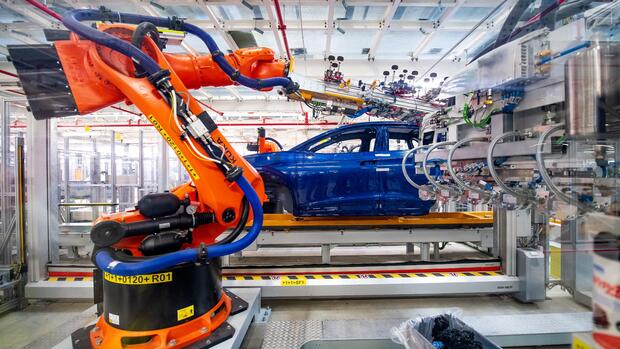The automotive industry was one of the pioneers when it came to the use of robots. Many other industries are now following suit.
(Photo: dpa)
Munich In terms of robot density, China could overtake Germany for the first time this year. This is questionable, said Frank Konrad, CEO of Hahn Automation and chairman of VDMA Robotics + Automation, on Friday in Munich. “Without robotics and automation, we will not be able to maintain our standard of living.” The technology could also help bring the production of batteries, electric cars and fuel cells back to Germany.
Last year, China, with a robot density in industry of 322 machines per 10,000 employees, according to figures from the world industry association IFR, already surpassed the USA with 274 machines per 10,000 employees. In China, every second new robot is now installed.
According to VDMA estimates, in 2023 the country could for the first time show a higher degree of automation than Germany, which had 397 machines last year. Chinese companies are good at scaling – i.e. producing large quantities, said Konrad. In addition, the state is consistently driving the issue forward with a five-year plan.
Global Achievements
The German suppliers of automation technology and robots are benefiting from the increasing global demand. According to the VDMA, the global sales of companies could increase by 13 percent this year to 16.2 billion euros for the first time.
“During the pandemic, the providers built up large order backlogs, which are now being gradually reduced as the bottlenecks in the supply chains ease,” said Konrad before the Automatica trade fair. Last year they had increased by five percent. The growth was slowed down by the lack of chips.
There are currently two main drivers for the further increase in demand for robotics and automation: The shortage of skilled workers is also forcing smaller companies to automate, which were previously rather skeptical about the use of robots.
Companies are bringing manufacturing back closer to home – with the help of robots
According to a study by the Family Business Foundation, for example, a good 44 percent of industrial companies complain about a lack of specialist staff. According to the German Economic Institute, the shortage of skilled workers in Germany reached a new high last year with 630,000 vacancies.
In addition, in view of the experiences from the corona pandemic and the Ukraine war, many companies are bringing production back closer to home and diversifying production. However, this is only possible with particularly efficient production.
The largest German robot manufacturer is Kuka, which has belonged to the Chinese Midea group for several years. The Augsburg-based company has meanwhile been in a crisis, but was able to increase sales, including plant construction, by 18.6 percent to 3.9 billion euros last year.
The Kuka incoming orders even increased by a quarter to 4.5 billion euros. Automation is currently more in demand than ever across all industries and countries, said Kuka CEO Peter Mohnen, “especially due to the corona crisis and the omnipresent shortage of staff”.
In addition, there are also many medium-sized providers and start-ups in Germany, especially in the growing field of collaborative robots. For example, the RAG Foundation formed the robot group United Robotics, and companies like Franka Emika and Fruitcore develop cobots and operating systems.
According to preliminary figures from the industry association IFR, 531,000 new robots were installed worldwide last year, an increase of two percent. That’s twice as many as seven years ago.
More: SMEs overcome skepticism about robots

